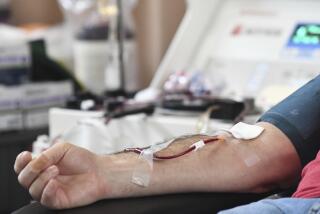Don’t Take Blood if Man Had Gay Sex Once--FDA
- Share via
ATLANTA — In revised guidelines aimed at eliminating AIDS virus from the blood supply, federal health officials recommended today that any man who has had sex with another man even once in the last eight years refrain from donating blood.
The national Centers for Disease Control has for years considered homosexual or bisexual men with multiple sexual partners to have an increased risk for acquired immune deficiency syndrome.
But the latest recommendation from the Food and Drug Administration, published by the Atlanta-based center, applies even to men “who may have had only a single contact, and who do not consider themselves homosexual or bisexual.”
The FDA stopped short of saying that any man who has ever had gay sex is at increased risk for AIDS. “But we would certainly consider them able to be carriers,” said Susan Cruzan, a spokeswoman for the FDA.
AIDS is an affliction in which the body’s immune system becomes unable to resist disease. It is most likely to strike homosexuals, abusers of injectable drugs and hemophiliacs. The disease apparently can be spread by sexual contact, contaminated needles and blood transfusions but not by casual contact. It has struck more than 12,000 people in the United States since 1979, and more than half of them have died.
American Red Cross officials announced that they will issue the revised guidelines to their blood centers next week.
Federal health officials have “no quantitative numbers” on how many AIDS victims may have gotten the disease through one or very few homosexual contacts, disease center spokesman Bob Alden said.
More to Read
Sign up for Essential California
The most important California stories and recommendations in your inbox every morning.
You may occasionally receive promotional content from the Los Angeles Times.










